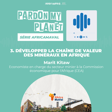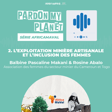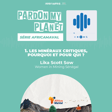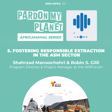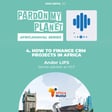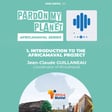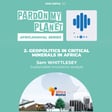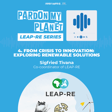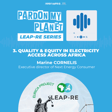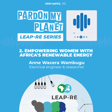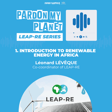Become a Creator today!Start creating today - Share your story with the world!
Start for free
00:00:00
00:00:01

ESG conditions and women in mining in Africa
This episode is focusing on ESG conditions along the CRM value chain in Africa, placing special emphasis on women in mining in Africa.
Transcript
Bridging Continents: Africa-Europe Partnerships
00:00:11
Speaker
Hello, and welcome to Pardon My Planet podcast. I'm Angela, the host. This episode is part of a series called Bridging Continents, the Africa-Europe Partnerships for Critical Role Materials. Today, we'll be discussing the crucial role of ESG, Environmental, Social and Governance Standards in African Mining. These standards are shaping the future of responsible resources management,
00:00:38
Speaker
Joining us today is Zenzi Avasis from AOIMA, the Association of Women in Mining in Africa and an organization dedicated to empowering and supporting women in the mining sector. AOIMA
Understanding ESG in Mining
00:00:52
Speaker
is also in charge of analyzing ESG conditions for Africa Maval, a European project dedicated to building EU-Africa partnerships on sustainable raw materials value chain. Hello, Zenzi. Hi, and thanks for having me.
00:01:07
Speaker
First, what do we mean when we talk about environmental, social and governance standards and what does it mean in the context of mining? So um as you know, ah mining is ah it's an extractive, I want to say mechanism. The action is extractive. So whatever you extract from the earth to um for the use of human beings and animals, I guess, but for the use of of us here on earth, um that is taken out of the earth. okay So um um with ESG, what we're trying to do is making sure that the environment is taken care of.
00:01:43
Speaker
um So with when you're mining, you use specific material or mineral equipment or even material that's called um material that can negatively effect um affect the the surrounding area where the mining is taking place. The other thing that mining is also impacts is the social um um circumstances around around the region where they're mining. So it could be that um in a specific place where they are mining perhaps a ancestral grave for whatever reason. So how is that treated? How how is the mining activity treating um the the women and children in that area or the people in that area?
Diverse ESG Conditions Across Africa
00:02:20
Speaker
And then under governance, it's basically looking at what are the laws that protect the area under which mining takes place. So in a nutshell, that's what ESG basically is looking at in in the mining sector. Since Africa is very diverse, how do ESG conditions vary across different regions and also type of mining operations in Africa?
00:02:43
Speaker
So there are two distinct types of methods are mining methods happening in Africa um um historically and and currently as well. That's large-scale mining. Now, large-scale mining is usually done by and a huge ah mining um organization with lots of money. that That's the first thing. okay The artisanal and small-scale mining is is It has been until recently very informal. You just go to an area where um but usually close to a large scale mine because you know that there wouldn't be there if there's no mineral, for example. And then you just use use the most um most basic method of mining and and start mining with it.
00:03:26
Speaker
Now, um with is with with the-scale mines, it comes with a lot of safety standards, a lot of because they have to report to their to their shareholders that the mining that they're doing is done ethically.
00:03:42
Speaker
right But until recently, small-scale mining was not monitored like that. You just go, you dig a hole, you take out, you use whatever needs to be taken ah used to liberate or to to to extract the mineral that you're mining and box your uncle. you know So so that's that's a huge difference. And also, um Africa as a continent um The mining um appetite, can I call it that? Maybe culture is a little bit different. um I've had the opportunity to travel across the continent with with the African mobile project and just look at the various ways of mining. So in Southern Africa, for example, you see a whole lot more large scale mining activities taking place than you see in other parts of Africa. So um you know so you you you do see where the environmental effects on mining is much more prominent.
00:04:33
Speaker
from small-scale mining business in countries where you don't have so many large-scale mines with their with their regulations, etc. And um we had in this series Jean-Claude Guienot, he is ah the coordinator of Africa Maval. He also mentioned that ah small-scale mining is a huge part of the mining, ah ah let's say, operations in ah in Africa. ah that In types of numbers, what we what are we looking at?
00:05:03
Speaker
that's that's one of the challenges and that there there is that the um um data is is such a a very difficult thing to get hold of. you know I can't even try and estimate because um there is no real number to it. But it's he's quite right. It is actually the majority of of of of ah mining activities is done through small-scale mining. That does not take away from the fact, and especially because it's not recorded. You don't know how much it is. And and and and I guess the drawback to that is that you then don't know how much the continent is actually um has in terms of reserves.
00:05:39
Speaker
and how much it does not have. Because what we know of what they have is the the the data that is submitted by the large scale mines. So yeah, no, I can't give you a number on that, unfortunately. Okay.
Ethical Mining Practices and Cultural Respect
00:05:51
Speaker
And how do you approach um the the structures also maybe of the small scale mining, ah since it's very difficult to know how many there is, how do you approach them with yeah ESG conditions in in mind?
00:06:05
Speaker
So um I'll try and answer that from from an Awima perspective. So the Association of Women in Mining in Africa was established um in 2015, roundabout, with the idea that it will be a tool that will help to implement the the African mining vision.
00:06:24
Speaker
um The African mining vision has got various legs to it and one of them is the gender equality. Now, they realize then that you know African mining vision cannot be implemented without having the gender perspective to it. So at that point, when they were looking at it, they were looking at only small scale miners.
00:06:43
Speaker
you know and so we are able to obviously over the years it has evolved because now you're realizing that it's not just small scale miners so what we do is that we we um we are able to through our because it's part of our objectives is to then let our our members know about the dangers and and everything else. So we through our advocacy we use our advocacy both ways through um taking it up to the policymakers, but also bringing it down to the the ones who are affected by by the policies. So yeah through communications, through through advocacy, we we we we we bring the reality to our members.
00:07:22
Speaker
And to take ah this topic a bit further, we'll circle circle back as well as the role of of women and how ah they thrive in the mining sector and what are their challenges. and First, how can ESG practices, from what you've seen on the field, ah what can be improved ah to better support social equity in African mining operations, and also what role can governance structures play in this?
00:07:51
Speaker
So, you know, I'm a mother, so I try to explain things the way I learn to my children, um um because sometimes the most most most most basic way of explaining it ah makes sense, right? So I try to be illustrative. So here's the thing.
00:08:07
Speaker
What we know is that whatever is in the earth is valuable. but So I'll take lithium as an example. We know that lithium forms part of a very important process that will then eventually um'm lead up to cleaner cleanner um um energy and at the end of the day that will lead up to to a much more clean earth. So we also know that that the mineral that that we are mining has got a very good use. We also know that the extraction of this mineral will eventually result in money um being exchanged. and um And that money that's being exchanged will then better, because it's a man that's come in, so you're going to improve the lives of whoever has come in. Whether it is to the small scale miner, the large scale miner,
00:08:52
Speaker
or even the end user in Europe or not. So either way, there is there so there is there' a very beautiful line going through. Now, what needs to happen is people need to start taking one thing into into account. We only have one Earth.
00:09:08
Speaker
There's no other planet Earth. okay um So we we need to take that into account and that goes again across the entire value chain of mining as from the um beginning to the end user as well as the the one affected.
Harmonizing ESG Standards Globally
00:09:22
Speaker
Now ESG is not a thing that is exclusive to the end user.
00:09:29
Speaker
And that's what we always bring down to our our community when we speak about this to our members, that it's not the responsibility of the, or it's not the sole responsibility of the ones who are coming to look for these minerals and say, you must say make sure that I have the right, that I live in a clean environment.
00:09:48
Speaker
At the same time, those who come with their money and all the equipment must also realize that without those people in the area that they're mining, there will be no mineral that they actually need um for for for their end use. And at the same time, the government, um both from the end user, and I'll use an example of the EU, and then Africa, because that's what I'm familiar with,
00:10:13
Speaker
So both the governments of of of the EU and Africa need to be very aware that they their role is to make sure that everybody is taken care of. From the end user to the um ah you know um the the ones who are going to benefit and at the end of the day as human beings we are all going to benefit. right So when you write specific acts it should not be exploitative. It shouldn't be that you're coming to mind in Africa for your benefit but the Africans are not benefiting. It must really be a symbiotic relationship, a partnership that must come out of it.
00:10:50
Speaker
so Also, what what what everybody needs to take into account is that at this point in time, as Africans, we are also equally educated. I mean, here we are having a conversation over on the internet. You can hear English, I can hear English, and we are speaking about a topic that affects everybody else. There's nobody more superior in intelligence or anything else in in in in in this case. We know what that mineral um needs to do and has done and and and and how it will be used. So if if we can get that right, that's a very basic step. Mutual respect for each other, everything else will go away. Now, what you find sometimes is that, um um and I can't think of an um an example, um or and and I should not even, it will be unethical to to name someone,
00:11:40
Speaker
um But what you find most of the time is there, you know, that somebody will come from the global north and say, hey, you know, I'll come with a couple of bags of sugar. And I want now the cobalt in the DRC, for example, and that's not all that should be happening.
00:11:57
Speaker
I think for us to rectify a lot of things, we need to just sit down. I introduced a topic or rather a phrase a couple of weeks ago. It says, it says, wonja atiing which means wait a little bit. I feel like we all just need to press the pause button and just sit still for like five seconds, but a very prolonged five seconds.
00:12:18
Speaker
and really just ask each other the question, what is it that we want to do? Do we need to do everything else? Does the evolution really have to take place now, the way we want it to take place? Do we need to have all these extra new technologies right now? Do you understand? So it's really a fine balance of progress against advanced users. So who um at whose expense are you going to do it? Must it be at somebody's expense? How do we come to a place which is mutually beneficial for everybody else? I think I went way beyond the question, but I think you get the gist of it.
00:12:56
Speaker
ah Exactly. And it's ah clearly a global question that even goes to this time the end user of thinking also about the needs and the the growing needs of the whole world ah regarding those critical raw materials and all the questions it it raises, obviously. Is it possible to harmonize ESG conditions in such a wide continent?
00:13:21
Speaker
Absolutely. Look, look, the one thing we have in common, and it's not just Africa, I think it's it's it's the entire human race. The one thing we have in common is just common decency, okay?
00:13:34
Speaker
um Nobody wants to live in a dilapidated condition at the expense of the other. And of course ESG should not be the one that should be box boxed into something because and the it's not a cookie cutter because what what is ah defined as decency in one part of the world, let's say Africa, um is different from the other part of the world. I'll just quickly digress it, but it's to the point, I went um on, I think it's book actually part of the Africa Mobile Project, we went to Mozambique to do some data collection. And I think on day two, day three, our hosts then text us out for for dinner.
00:14:17
Speaker
And Mozambique is known for the amazing, amazing seafood, right? So we are taking to a seafood restaurant where they just take out the the the seafood from the, you know, and from where I come from, I immediately start eating with my hands.
00:14:32
Speaker
okay And this girl is looking at me and she goes, what are you doing? And I said, no, I'm eating. this is And for her, that's indecent because for her, you need to use a fork and a knife. So in in in her household, for example, it's looking as very weird on, and it's a very basic example, but you know what I mean, right? We both come from the same level level of education. We both come from the same background in mining.
00:14:57
Speaker
or the extractive sector. um But a small thing like how you eat is is is viewed differently in terms of decency. So um I think coming back to the original question of how can it be harmonized, it can be, um but I think at the end of the day, we have to understand that it will not be the same. The interpretation of a proper ESG framework, for example, will not be the same um everywhere.
00:15:23
Speaker
whether it is in Namibia, in Mozambique, Germany or even Brazil, it will be different everywhere.
Challenges for Women in Mining
00:15:29
Speaker
At the end of the day, coming back to the original thing, we have to understand that we have one Earth and how we look after this planet is the key.
00:15:38
Speaker
Circling back to ah Awima and the role of women ah in the in the mining industry, how are they involved, the women in the mining industry? like How does did it evolve and what specific challenges do they face nowadays?
00:15:58
Speaker
So, um and and I'll bring this home to to Africa. So one of the the, I always say when we strive for gender equality, um there's diversity and there's inclusion. I believe that diversity plus inclusion equals to the equality that we want to achieve.
00:16:17
Speaker
But the biggest problem, and that's the challenge. i'll I'll talk about involvement because the mere fact that we are here, it means that we are involved. We are involved across the value chain. um um We've been involved umm very actively. you know are women being established in 2015. So we are part of certain decision-making roles, et cetera, et cetera, very, very slow, the implementation thereof. because And then that that's, again, a very global thing. It's not just in Africa, but a specific thing. um In leadership, you see only about% of women are in leadership, and that's not just in Africa, it's everywhere else in the world.
00:16:56
Speaker
That's why you've got Women in Mining Association across the continent well across the world. ri so um But slowly but surely, we're coming on board. And one of the and I think that the the whole talk about diversity has proven that um you know we bring a very different perspective to to to the to the discussion. so And we are not here to kick a man off to get his job. will We actually are keen to partner with a man um with the knowledge we have to come to a solution. But here's the problem. Here's the biggest challenge. The challenge the challenge is not even the fact that they still earn more than ours and the fact that we you know must um take stay at home for maternity. That's not the challenge. The challenge is unconscious bias.
00:17:38
Speaker
and unconscious bias um which is ah unconscious bias, which is encouraged further by deeply entrenched cultural and societal norms, that is our challenge. Now, imagine going to sit in a very big meeting and somebody says to you, oh, Zenzi, can you please take the minutes?
00:17:55
Speaker
No, I'm not taking good minutes because I'm also a geologist. Like what what are we doing here? So those are, you know, it's it's in this unconscious bias because this guy doesn't even realize he's done that, you know. So that for me will always remain the challenge when it comes to gender. um um and And again, just like I was talking about ESG and whatever, um it comes down to a very self-conscious decision to tackle that barrier.
00:18:20
Speaker
um consciously. Do you have any concrete examples of maybe challenges ah that certain women face in the mining industry and how Awima helped them also, let's say, overcome those challenges or at least address them?
00:18:38
Speaker
There are so many, and I should have prepared for this question, um but I'll try and bring it home to Namibia, where i'm I'm the president of the of the association association Association of Women in Mining in Namibia, so I'll try and bring it home here. um One of our challenges has always been that of maternity.
00:18:59
Speaker
You know, I mean, I can't help it. I'm a woman and my natural i want to almost say ah role is to be a mother, you know, and and so so always try to see how can you bring across the point of maternity um into a policy. Now the national policy when when it comes to maternity is that you have three months of maternity leave. They give you off one month before confinement and then two months after confinement. So you know and that works if you are an office lady you know so at two months you can go back to the office and you can come home to breastfeed your baby etc etc right on the mind it's different because most of the time the mind is far away
00:19:44
Speaker
um It's in remote areas from so you either have to um take your an nanny with you or you know what. And so we advocated that we review the maternity leave policy because the other national policy is that you have to have six months to breastfeed your baby.
00:20:03
Speaker
So at least now, um you you if you get it at six months, then leave the baby at home and then and then come go back to work. So that's one thing. But the other, maybe more more to the topic, one is somebody who couldn't, um who faced a lot of sexual harassment cases, and then the company didn't see it as sexual harassment.
00:20:25
Speaker
and now that it we we its It's really just to bring awareness to the to the topic um that um that you know we are here as women, that's diversity. We want to be included in the whole discussion, um that's inclusion. But now how do you do that when you exclude us from basic things such as you build a new mind, but you don't build a toilet for a female?
00:20:52
Speaker
because historically um there was only men on the mind. So just bringing awareness to that. But I think most most significantly um um on a women's scale is to taking the case in Ghana where we were able to be involved in the gender mainstreaming studies.
00:21:09
Speaker
that the the the government of Ghana is doing at looking at the especially on the mining sector, realizing the role we play in the sector. So we've been involved um with Wim Ghana to try and assist um in in and the government in doing gender mainstreaming studies. So it's it's quite a basket that recently with the frame, we we had five French speaking countries Pogo, Benin, DRC, one of the biggest, biggest, biggest, biggest challenges we face um is the woman in mining community. And that's with gender-based violence. um And that that that particular project was funded by a French agency, but they funded us to help try and reduce that. And how do we do it? We did it through, but it was a six months long project. We actually got the men involved.
00:21:57
Speaker
to talk with them and get their side of the story. um um It was a beautiful, beautiful project where at the end of the day we were able to come to to the root of the issue and ah my prayer is that we can actually duplicate this project across the continent and and the lessons learned from this French project if if man enough um I can't say the word because I'm not French speaking. that That's just the abbreviation they are. And then duplicate across the world because GBV is something that is so downplayed, especially on mines.
00:22:33
Speaker
um And so we we we would love the the results of this project is on our website, on the women website. and and And I would love everyone to go there and perhaps give us more funding to do the ah project. But yeah, so we we are involved in every um way, whether it is from policymaking to implementation of policies, as well as issues um and opportunities affecting our women.
Recognizing Female Leaders in Mining
00:23:00
Speaker
those women who also lead themselves initiatives where they are based, you have put in place an African Women Mining Award. Can you maybe elaborate a little bit on that and tell us ah what this is about and the the type of women also that let's say gets ah an new award?
00:23:22
Speaker
So this is actually, um this year, it it was the inaugural. It was the first time we did it um because we realized, you know, we've been in existence now for 10 years almost. Yeah. And we've been working very, very hard in just trying to establish the association, in trying to see, making sure that we are the go-to association when it comes to gender in Africa. And so this year,
00:23:51
Speaker
we It's something that was actually birthed two years ago, but you have to work very carefully to to construct the the the concept and and be waiting for the right time. So we we then thought, what are the types of leaders that has been going across as long as we know? One of the oldest associations actually, Women in Mining Association, is from Tanzania. It's Tawoma. I think they're celebrating their 40th.
00:24:18
Speaker
Nigeria just celebrated 40 years, but so it's yeah know it's we've been around for a while, so what do we do? So we looked for the pathfinder. Who is the woman who went out there to carve the way for us to to break the ceiling for us to be able to walk through and being able to sit on tables where we couldn't do many, many years ago?
00:24:39
Speaker
So that's the Pathfinder. We also had an award for the Gender Equality Activist. That's the woman who, regardless of the circumstances, she went out there and she advocated. And, you know, I must tell you, to be an advocate or to be a pioneer, especially in an advocacy, is not an easy thing. um You are sidelined, you are called a rebel and all of that. But a woman who went beyond all of that and and still advocated and in now sits in governments or in in in in heads of um companies and still that kind of woman. We also had the small-scale miner. As we mentioned, small-scale mining is something that's been with us for generations. But who is the woman who's gone beyond this ordinary way of small-scale mining, but somebody who's gone and basically used innovative ways
00:25:30
Speaker
um in in in in small-scale mining I think and and the we normally name per region and and I can think of one good example is the one who got the award in Tanzania this young lady um she actually should have gotten in the path and find her in my opinion but but she she basically was a small-scale miner she was been in the in the rigs my are mining tanzanite in Tanzania to- today she owns an amazing jewelry line So she basically went from mining these metals and gemstones to owning a gemstone, just across the value chain. And then we had the pathfinder, then we had the one who's upcoming, Rising Star. So who's the young lady out there?
00:26:11
Speaker
who's basically who' standing on our shoulders, you know? I'm forgetting the fifth award. But yeah, so we were very particular in how we are choosing them. So we went on a very big campaign. We asked for nominations across the continent and it came in by flats. We got over a thousand nominations. I think 1,600, I'm not mistaken.
00:26:30
Speaker
And then we then gave that to an independent panel of judges who are not part of AWEMA and we asked them to go through all these applications and um we narrowed it down to 25. So we chose five per region um and we had 25, I think 22 awardees actually, yeah.
00:26:48
Speaker
It was amazing. I think it was something we're gonna we we will repeat next year. We will make be making the announcement soon. at the you know But yeah, it's nice. I mean, everybody who wants to be recognized
Sustainable Practices for Critical Raw Materials
00:26:59
Speaker
for what they're doing. So it was a very, very beautiful ceremony. Yeah, it's a very inspiring award as well. So congratulations on this because ah I find it's amazing. And I remember ah we talked before this episode and you mentioned that when some partners saw how many women were involved in mining in Africa, they got their mines blown. In fact, actors at the awards ceremony, you know, because, and like I always say, so my eye I in Namibia, we hosting a summit in two weeks time, it's it's going to be the first ever mining summit that's looking just at entrepreneurs. So because for years we were looking at um on on the career, sort of sort of labor issues, but now we're looking at the entrepreneurs. So we are hosting a summit that will bring together the entrepreneur with the, you know, all of that.
00:27:47
Speaker
And then the men will always say, but where are the women? I said, okay, I'll show you where they are. So now, when we met in Accra, Ghana for the ALAS, we call it the um African Women in Mining Leadership Awards. When we met them, this one man who was one of our sponsors, he walks in and he goes, are these all women in mining? Because you must understand, we arrived there, we were all dressed up and the makeup was done and we were wearing all our jewelry.
00:28:16
Speaker
And this man, and I'm like, yes sir, that one's a geologist, that one there is a mining engineer, that one owns her own mine, he could not believe it. I said we are there and we are there in throes. I mean, a women alone and and in this mall, we represent at least 50,000 individual women um in Africa and with the campaigns we're going on, especially next year,
00:28:39
Speaker
That number will increase because we're going to create more awareness about a women, what we do. So no, we are there and we are then throws and they cannot believe it. If you sit, for example, on government level, they think that you are a secretary. And then I just got back from Nigeria. So so one of the ladies who she says, I hold a PhD.
00:29:01
Speaker
So you call me engineer doctor. That's great. I like this. We are there. We are so many.
00:29:12
Speaker
Here we are talking, especially with Africa-Maval, we are talking about ah critical raw materials. Does ah there need to be any type of ah caution or let's say extra security regarding those critical raw materials in relation to ah ESG, maybe the way it's extracting or the types of ah materials we are talking about, the minerals we're talking about,
00:29:38
Speaker
Do you have to be ah careful about that or take, let's say, extra precautions?
00:29:46
Speaker
I mean, so so we know what the the properties of these minerals are and I think those who come and who extract them know what they are, so we have to be very careful around that. um Again, the caution then comes back to the end user as well as the ones who come and extract especially with um the forthcoming with small scale mining, um that doesn't have all the restrictions um you know that large scale mining would have. You don't want to just come here and say, oh, you are sitting on a nickel mine. Let me get that from you for an X amount of money. You want to really co um play caution and know you should know um what the dangers are of this metal um material that you're requiring from this person. So one thing I was strongly, strongly advocate for
00:30:34
Speaker
is that once people come into the smaller parts of Africa, um that um that's not on the radar, please be aware of what you're doing to our people. And that that's the S part, be aware of the social part, the governance part, obviously, you know, that the laws are written, but it's not implemented or it's implemented, but it's not evaluated properly. But I think it again comes down to common decency. Just know that this thing will make you lots of money. The most decent thing you can do is at least take care of those who are mining it for you.
00:31:05
Speaker
Absolutely. And for the environmental part as well, are there like extra, or let's say ah precautions or things that should be taken into account or is it, let's say, the same for all types of mining? I think it's the same, but I think we also have to realize so that that the the criticality of the minerals um changes over time. You know, now it's lithium and cobalt and all the battery minerals now, you know, in a couple of years there was an indifferent I think so. you you You cannot narrow it down to what is the one thing you must do differently. It comes down to we've got one planet. Come back to whatever your your your methods of extraction and end use should be sustainable at the end of the day. It should be feeding
00:31:49
Speaker
but The child here where we are mining and the child at the end who's going to be the engineer. So sustainability, sustainable use of all of them, I think is is perhaps the answer that we're looking for, because you cannot narrow it down to the um the specific minerals right now, um because there are a whole list of them that are critical, but um they're over 100,000. Maybe I'm exaggerating, okay.
00:32:12
Speaker
There are a whole lot more minerals in the belly of our reserves. And the criticality will change over a couple of years. Next year, it will be, I don't know, silica. And that could just be sand. What do you do then? So you cannot narrow it down to be careful about this. It must come down to human behavior. That maybe is the end answer. Human behavior is what needs to be implemented for proper ESG framework to work.
00:32:42
Speaker
Absolutely. Thank you, Zenji, for taking the time to chat with us. It was a pleasure. The other episodes of this series and all the episodes of Pardon My Planet are available on Spotify, Apple Podcasts, and at lgi dot.earth. podcast. Until next time, bye-bye.
